Jadrolinija Tourist Traffic Picking Up in Split without Ferry Port Crowds
July 4, 2021 - Jadrolinija tourist traffic is picking up at the Split Ferry Port, and with the agency working 24/7, there aren't the usual summer crowds!
The Jadrolinija agency at the Split ferry port is looking forward to increased traffic.
Slobodna Dalmacija reports that their counters work 24 hours a day, all to avoid crowds, meaning the famous traffic jams and general chaos that would regularly greet us during the summer months, especially the first weekend of July, are a thing of the past. Furthermore, this summer, the road to the station and the terminal is passable despite the works on the reconstruction of the City Port.
Jelena Ivulić, the head of the Jadrolinija agency in Split, revealed this summer's secret.
"There are crowds, but everything is flowing, everything is fine, so they are not seen as before. We work non-stop, there is no waiting for boarding, and again, our ferries are full.
This weekend we expect about 40 thousand passengers in both directions and about 11,500 vehicles on ferries. Passengers arrive at a steady pace, most tourists from Slovenia, Poland, the Czech Republic, and Slovakia, with of course our domestic travelers.
For now, there are no extraordinary lines, but since July 2, we have increased, as usual, the number of lines, so now we have 14 regular departures for Brač, seven for Stari Grad, three for Vis, and six for Šolta.
The summer sailing schedule includes later departures, too. At midnight is the last ferry to Supetar and at 1:30 am to Stari Grad. Certainly, the ferries are nicely filled, but there is no waiting. Let it continue like this, and we are there for the passengers, available 24 hours a day," Ivulić told Slobodna Dalmacija.
Jadrolinija is at 65 percent of turnover compared to 2019.
On Saturday, the MSC Magnifica, which sails the eastern Mediterranean from Italy, is also on Split's itinerary. Magnifica brings about 1,200 passengers to Split who can explore the town, but under strict measures.
"Anyone who wants to go out can only do so as part of MSC's organized excursions, not on their own.
There is no separating from the group. Everything is going well in the port, there are no crowds, no extra ferries, the works are in progress, but they do not interfere with traffic, so today is an exemplary summer day," said Vicko Vrgoč, head of the Port Operations Center, on Saturday.
He says that the arrival of 155 cruisers in Split has been announced for this year, but all this is very uncertain and depends on the pandemic. We remind you that the record year was 2016 when 286 cruisers came to Split.
"In any case, we are very satisfied and expect an increase in numbers. June was great, and we are optimistic for July and beyond - it will be convincing."
For more, follow our travel section.
2021 HNS Elections: Will Marijan Kustić Replace Davor Šuker?
July 4, 2021 - The 2021 HNS elections will be held on July 29 in Zagreb, where Marijan Kustić should replace Davor Šuker as the Croatian Football Federation president.
The Croatian Football Federation (HNS) has called elections. An Assembly to elect a new president, vice presidents, and the Executive Board of the Federation will be held on July 29 at noon at the Westin Hotel. The process has begun in which interested presidential candidates must receive the official nomination of their county union and the signatures of support from six more counties. The deadline for submitting the candidacy is July 14, i.e., 15 days before the Assembly.
ZNS, which has had a president for decades, especially two longtime Vlatko Marković and Davor Šuker, will not highlight its man this time but will support Marijan Kustić. According to information from football circles, it is very likely that Kustić will be the only candidate. He is a representative of Lika-Senj County. Although, of course, someone else can always get into the race.
"The candidate we will support will certainly be the new president," Tomislav Svetina, the first man of the ZNS, told Sportske Novosti. Kustić is the current executive director of the Federation.
In the week ahead, Kustić is officially embarking on a short campaign. First of all, he must be nominated as a candidate by the Assembly of the National Assembly of Lika-Senj County, which is a formality. According to the agenda, the HNS Electoral Assembly should begin with a greeting from the previous president Davor Šuker. The question is whether he will show up.
Why did Suker fall? HNS says the trigger was an Executive Board meeting in March that he did not want to attend even though he was sitting in his office in the Federation in the next room. Moreover, he tried to undermine its maintenance was dissatisfied with some decisions. At that session, a new Commission for Judges was elected with President Bruno Marić, and some marketing decisions were made that Šuker did not like. However, the reasons for his end in the HNS are certainly much deeper.
HNS is negotiating with Stipe Pletikos as a new name in the Federation. The function of the technical director was mentioned, then the director who would take care of Croatian players around the world so that the "Sosa case" would not happen again. Some also say that it is possible for Pletikosa to be a member of the Executive Board, which will be resolved by the Assembly.
To follow the latest sports news in Croatia, follow TCN's dedicated page.
To learn more about sport in Croatia, CLICK HERE.
Archipelago without Plastic: Krapanj and Zlarin Islands Moving Away from Disposable Plastics!
July 4, 2021 - After almost three years of successfully implementing the initiative "For Zlarin without plastic", the initiative "Archipelago without plastic" opened in Krapanj and Zlarin this weekend, marking the International Day without plastic bags and the European Union Directive on Disposable Plastics in Croatia.
"For Zlarin without plastic" is an initiative initiated by Ana Robb, Nataša Kandijaš, Ivana Kordić, and Jelena Radošević to stop the use of disposable plastic on the island, making Zlarin the first Croatian island free of disposable plastics, reports HRTurizam.
The initiative was recognized and received great media attention, but also numerous awards, and with new partners - the association "Together for Krapanj" and the Tourist Board Krapanj-Brodarica, the project "Archipelago without plastic" designed a way to spread the Zlarin example to other islands - for a start, on Krapanj.
"In the past three years, the island of Zlarin has made significant progress in reducing pollution with disposable plastics, but also a shift towards the concept of sustainable tourism through which we provide visitors with summer content in the summer season," said Tatavaka and Together for Krapanj, which are launching this new initiative in cooperation with the Zlarin and Krapanj-Brodarica tourist boards.
The program will start on July 4 in Krapanj at the Hotel "Spongiola" with the signing of the Charter on Krapanj without plastic, and at the same time, the trabaccalo Desto of the Cukrov family, who are co-signatories of the Charter, will dock in the port of Krapanj. This 120-year-old wooden trabaccalo has survived the dominance of plastic ships, and on this occasion, it will become a mobile gallery of the artist Sanja M. Vukman and her exhibition of ecological signs entitled "Objects of an imaginary traveler through the archipelago of dreams".
The presented personal belongings of the imaginary traveler are real props for traveling through the archipelago experienced through the process of research and contemporary interpretation of traditional living. The exhibits are useful objects, field samples, seeds, working materials in the process, fragments, and fragments connected by the same longing to live the daily available poetry of small things.
Island caterers and other small entrepreneurs who primarily depend on the reduction of plastic distribution will sign the "Charter of Krapanj without plastic" and thus become the first island with which the adventure of "Plastic-free archipelago" begins.
The initiative is supported by the City of Šibenik, as a partner in the BeMed program project, as well as the Šibenik-Knin County. The project partner and support at the international level is SMILO - Small Island Organization, while the initiative is supported by Julije Domac, President of the Energy Transition Council of the President of the Republic of Croatia and Director of REGEA who will join the opening and "Island Movement" as a network organization island communities of Croatia.
The associations are especially proud of the cooperation with the ambassador of the "Archipelago without plastic" - Domagoj Jakopović Ribafish, whose project "RokOtok" symbolically connects Krapanj, Zlarin and - as the next step - the island of Prvić. Ribafish will start the implementation of this year's "RokOtok" edition by swimming between Brodarica and Krapanj, and will hold workshops for children in Krapanj and Zlarin.
For more, follow our lifestyle section.
Many Newer Croatian Emigrants Seeking German Citizenship
July the 4th, 2021 - The vast majority of newer Croatian emigrants have a poor perception of their homeland, with a fourth of them planning to adopt German nationality and apparently leave any trace of Croatia behind them.
As Poslovni Dnevnik writes, only around eight percent of parents from the newer generation of Croatian emigrants have enrolled their children in some form of Croatian curriculum in Germany, and more than 27 percent want to take out German citizenship, Vecernji list reports.
In addition, newer Croatian emigrants also visit Croatian Catholic missions/parishes less and have been removed from the register of those of the Catholic faith over in Germany.
This was shown by the research of political scientist and historian Tade Juric from the Croatian Catholic University entitled ''The perception of emigrants about Croatia" conducted in the diaspora in Germany on a sample of 1,200 respondents in 2018 and 534 respondents in 2021.
While many older Croatian emigrants, Juric points out, have lived for Croatia for most of their lives and invested all their capital, knowledge and emotions into the country, new research shows that the recent emigration from the so-called ''EU wave'' of emigration doesn't really have much of this idealisation of the homeland, on the contrary, a negative image among them prevails.
By the end of December 2020, Croatia had only 4.036 million inhabitants according to the Central Bureau of Statistics (CBS), and the emigration of citizens was't stopped during last year's pandemic-dominated travel chaos, in which 34,046 citizens still emigrated from Croatia, with 33,414 people immigrating to Croatia. Last year, 26,355 citizens emigrated to Germany alone.
Juric's research shows that Croatian emigrants believe that homeland and those who have left Croatia aren't effectively and successfully connected, that Croats in the homeland have a negative attitude towards Croatian emigrants and nurture numerous prejudices towards emigrants, but also that Croatia doesn't do enough to help emigrants and Croats outside Croatia.
''More than half of the newer Croatian emigrants have an extremely negative perception of the Croatian Government (HDZ) and events in the homeland, and only 5.6 percent have maintained a positive perception of Croatia at all,'' explained Juric.
For more, follow our lifestyle section.
Josip Aladrovic on Government Aid: Time to Separate Responsible from Irresponsible
July the 4th, 2021 - Labour Minister Josip Aladrovic has stated that it is time to separate those who are responsible and those who aren't when it comes to handing out government economic support to businesses, echoing comments about the link between being vaccinated and receiving government support made by the Prime Minister recently.
As Poslovni Dnevnik writes, the announced possible denial of job preservation/economic aid to companies where workers haven't been vaccinated has provoked many reactions, Labour Minister Josip Aladrovic was among those who offered their view on it.
''As far as harmonisation with the law is concerned, we haven't had any problems with harmonising everything from epidemiological measures to economic measures with the law. Everything was done in full accordance with the law. I'm sure that in the dialogue with the unions and employers, we'll find some good arguments in this case as well, and a quality and legal solution,'' Josip Aladrovic said for RTL.
''We have several models that we're going to present to unions and employers. What's certain is that we have all borne the burden of this crisis. Therefore, everyone living in the Republic of Croatia, all taxpayers financed this crisis with 34 billion kuna. Now is the time to separate those who are responsible from those who are irresponsible, to encourage accountability through vaccination and a greater level of integration of economic and epidemiological measures. And epidemiological measures now mean, in translation, vaccination,'' said Aladrovic.
''We need to be aware that we're in a health and economic crisis. To overcome this we need to raise the level of vaccination so that the tourist season isn't jeopardised at this time, and the economy as a whole and beyond can remain stable. We need to integrate the vaccination process with our economic measures,'' he said.
"This is an affirmative way, not a way to penalise those who don't want to get vaccinated, but we'll arrange our economic measures so that they help those most responsible,'' the minister said.
Does this mean that those who will have one or two unvaccinated people in their company won't be able to count on measures at all, or will that only be the case for those unvaccinated employees?
''It’s too early to say what the model will look like. We'll present it to employers and unions as equal partners in this crisis first, and then we'll know what its final appearance will look like, which will certainly be legal and constitutional, and which will affirmatively promote vaccination in order to minimise damage to the economy,'' he said.
''Employees of my ministry are certainly not all vaccinated, about 50 percent of them are if I'm not mistaken according to the latest estimates, which is slightly more than the average of the Republic of Croatia. But we're affirmative towards all state and public services and we'll also have to find a way for public and state services to function in the future and make a very clear distinction between the rights and obligations of those who are vaccinated and those who aren't,'' assured Josip Aladrovic.
''We will award economic aid to those who are most responsible in society. So, it's affirmative, that those who are most responsible can more easily cope with the economic crisis, that is, the business difficulties they face. As for penalisation, so far we haven't prescribed the obligation to get vaccinated nor have we penalised anyone. We now have a lot of critics on these measures. However, we talked a lot in this study about the measures when they were introduced, and we had an equal number of critics then. Now we have 56,000 more employees than last year, 4,000 more than in 2019, which was the strongest economic year since 2008,'' he added.
If the Government has failed to motivate all public and public sector employees, how do you expect any of the private employers to succeed in motivating their people?
''I expect the motivation to be the same for everyone. Today, we have a million and a half vaccinated citizens, a million and a half taxpayers who have taken joint responsibility for overcoming the pandemic, the economic crisis and the public health crisis. We must make sure other people follow the same path,'' he said.
''So far we're at the level of 11.7 billion kuna, with contributions that amount stands at almost 17 billion kuna. We covered 700,000 people and 120,000 employers. As the weather improves, the pressure on the measures decreases. But we must point out that for April and May, the projected cost is 400 million kuna. Intensive support to certain sectors is still needed. But we have to allocate these funds in a much better way, we have to allocate them to those who need them the most, we aren't running away from that,'' Josip Aladrovic concluded.
For more, follow our politics section.
Croatian Civil Protection Directorate Plans for Wider "Covid Passport" Use
July the 4th, 2021 - The Croatian Civil Protection Directorate is planning for the even wider use of the controversial ''covid passports'', and the plans, although not set in stone yet, could irritate a lot of people.
As Poslovni Dnevnik writes, the vaccine against the novel coronavirus isn't going to be made mandatory, nor are there any plans to change the law to allow for that, but people who don't have possession of the covid-digital certificate will be very limited in what they can do, Jutarnji list writes on Saturday.
As the Croatian Civil Protection Directorate told Jutarnji list, everything can be “elegantly” solved by, for example, introducing the obligation that every person who enters a health institution or hospital, be they an employee or a patient (of course except in emergencies) must have a digital covid certificate.
In translation, if this does occur, if an employee hasn't been vaccinated or can't prove that they have recovered from the disease, in order to come to work they will have to be tested every 48 hours. If someone is a patient and there is nothing urgent to be dealt with there and then, there can be no entry into the hospital.
This was partly confirmed by the Minister of Health Vili Beros for Index, saying that they are considering introducing testing when entering hospitals to ensure safety, but also that health professionals work for as long as their covid-confirmation lasts or be tested for the presence of the virus every 48 hours.
However, given the information Jutarnji received from the Croatian Civil Protection Directorate, in the foreseeable future it is expected that something similar will be prescribed for the entire public sector and beyond.
“First of all, we're going in the direction of vaccinating the people who are in the greatest contact with other people. These are drivers in public transport, teachers, professors, educators, healthcare workers, people who work at counters or are otherwise in daily contact with a large number of people. Our goal is to prevent the spread of the disease and create conditions so that in autumn, we don't end up with the same wave we had last year,'' explained Beros.
By all accounts, this will be a way to start living as before, at least for those who have a QR code or a certificate proving that they have recovered from the disease, that they have been vaccinated or that they have been tested within the last 48 hours.
This decision from the Croatian Civil Protection Directorate, as Jutarnji unofficially finds out, will probably concern even shopping centres, where people who have certificates could walk around freely without a mask and without maintaining social distancing. The only difference from the time before the coronavirus pandemic would be the reading of the code at the entrance to such centres.
''According to the information we have, it is very likely that in the near future entry into all larger spaces, which include shopping centres, will be possible only with a covid certificate/confirmation,'' reports Jutarnji list.
For all you need to know about coronavirus specific to Croatia, make sure to bookmark our dedicated COVID-19 section and choose your preferred language.
Croatian Pauza Delivery Service Disappears Following Glovo Takeover
July the 4th, 2021 - The much loved Croatian Pauza delivery platform is no more following Glovo's takeover. The business move was initially announced back in May this year, and the first Croatian platform of this kind has now been extinguished.
As Poslovni Dnevnik/Sergej Novosel Vuckovic writes, just as was announced back at the end of May, the once first Croatian web and mobile service for ordering and delivering food from restaurants - Pauza.hr, has now ceased to exist under that name and officially operates within the Glovo platform, one of the largest global platforms for delivery.
Glovo announced that it would take over the Croatian Pauza delivery platform as part of the acquisitions of the Delivery Hero group in seven countries in Croatia's immediate region, of which Pauza was a part. Now all the conditions have been met and the green light of the regulator has been obtained, and the transaction was formally realised.
The Croatian Pauza, therefore, will no longer deliver orders and no longer operates, which can be seen on its page as people are automatically redirected to the Glovo page. The same applies to the Pauza application, as explained by Glovo, otherwise the Croatian market leader in on-demand delivery:
“The entire content of their application and website has already been transferred over to Glovo. Users who enter the Pauza app will be redirected to Glovo through personalised links and will be able to easily register for Glovo in just a few steps. Users of Pauza's website will be redirected to the Glovo website,'' they pointed out.
Catering facilities already present on the Pauza platform don't have to worry, nor do the platform's users, because a total of 800 restaurants have been successfully moved over to the Glovo platform. Glovo also cooperates with the retail chains Lonia, Tommy, dm and even INA petrol stations, and users know very well that they can order almost everything at home or to their office - from sandwiches and fresh meat to flowers, drinks and cosmetics.
“On-demand delivery platforms have been well received on the Croatian market and we're glad to be part of that success. In a very short period of time, from the announcement of the acquisition of the Croatian Pauza platform to the realisation itself, we worked diligently to provide users with the same choice of food they had with Pauza, but more than that. We're convinced that by combining the content and operational expertise of both applications we'll be able to offer our users a much better experience and ultimately the overall user experience,'' said Teo Sirola, CEO of Glovo Croatia.
For more, follow our business section.
Cat Caffe, the Most Purrfect Place in Zagreb to Have a Drink
June 4, 2021 - Since its opening in 2017, Cat Caffe's mission has been to provide all cat lovers with a cozy place to sip at their favourite drink surrounded by felines going about their day in the background. Need a catpuccino to wake you up? Fancy starting the happy hour with a glittery catmopolitan? Zagreb's first cat caffe has it all.
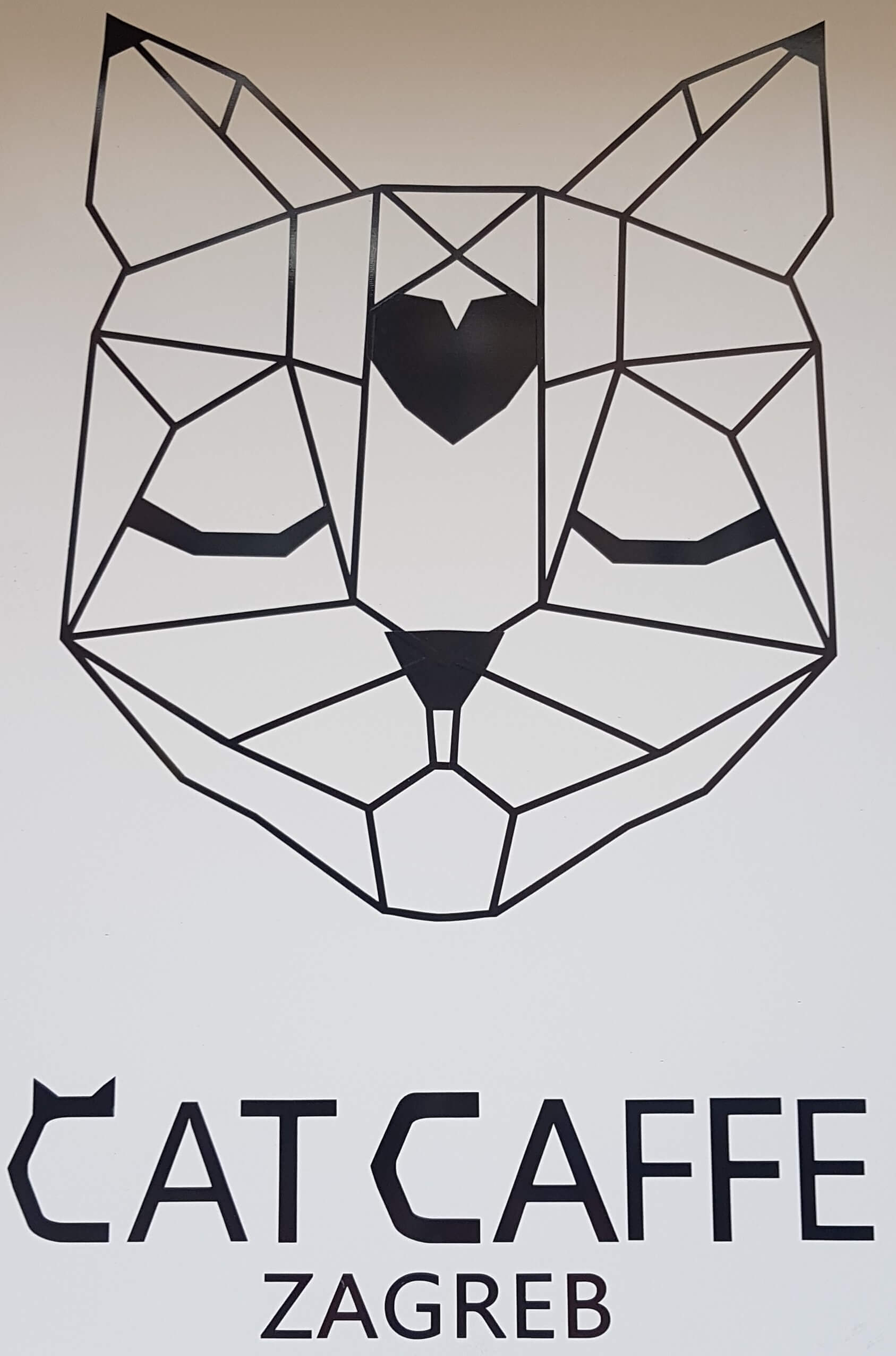
Croatia's first cat cafe opened only 5 years after Takako Ishimitsu introduced the concept to the Austrian public in 2012. And they loved it. There are currently over 60 cat cafes in Europe, and 2 years after Zagreb, in 2019, Osijek also got its very own cat haven. The pioneers of the cat cafe movement in Croatia were spouses Maja Mudrovčić Garvan and Domagoj Garvan. Delighted by the idea of giving the people a place to come and relax in the presence of cats, they persevered in the face of Croatian bureaucracy which never before had to issue permits and licences for a cafe which doubles as an animal residence. To the excitement of Zagrebians, Cat Caffe opened its door in October 2017 at the address 6 Kušlanova Street.
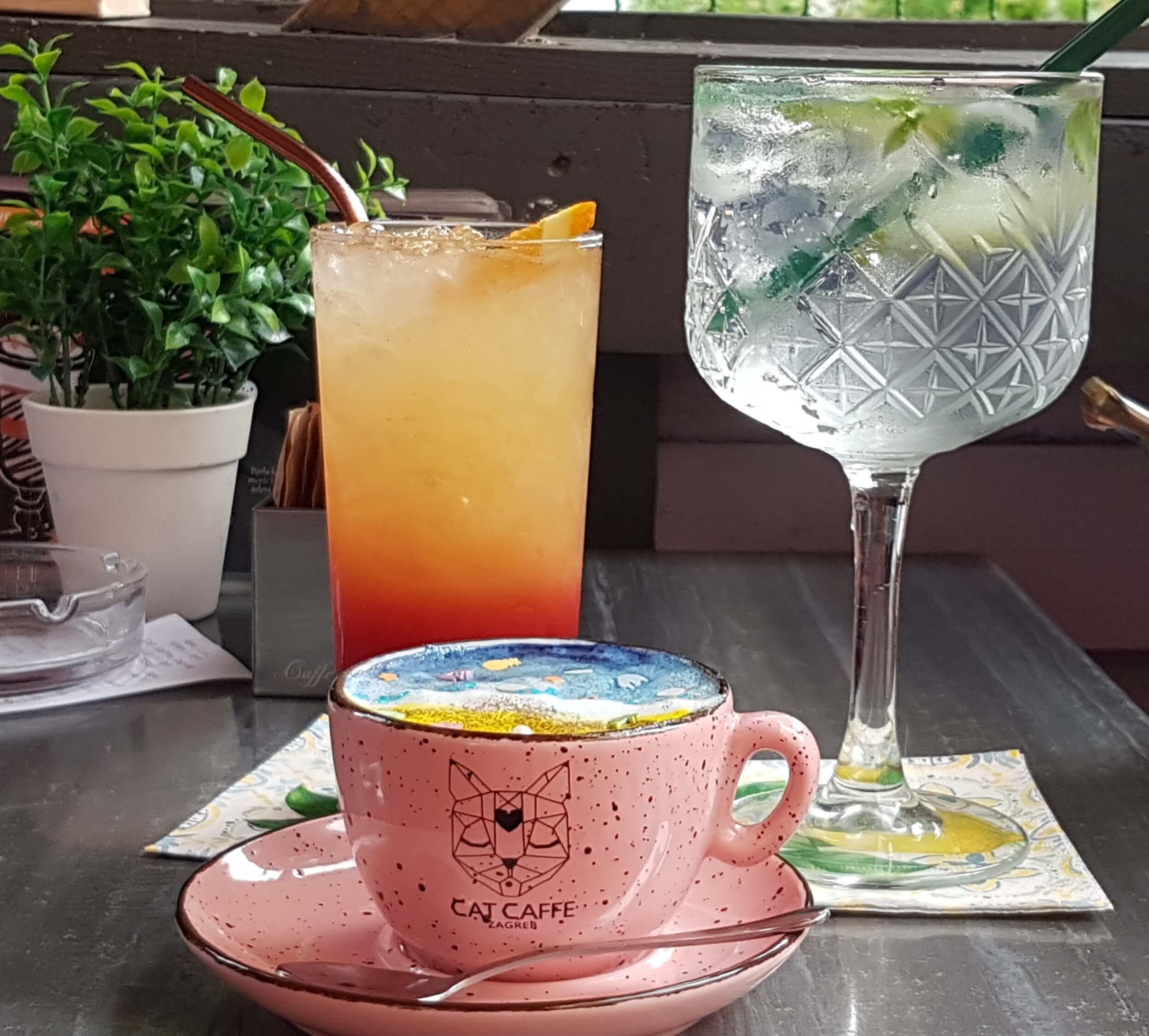
Almost half a decade later, Cat Caffe has become a home to a dozen cats. Its initial residents - Frieda, Poussey, Big Boo, Flaritza, Crazy Eyes, Taystee and Nicky got their names after the characters of the show Orange Is the New Black. All cats who live in Cat Caffe have been officially adopted from Fauna, an animal rescue shelter in Kutina by Maja and Domagoj and have been neutered and through the process of socialization.
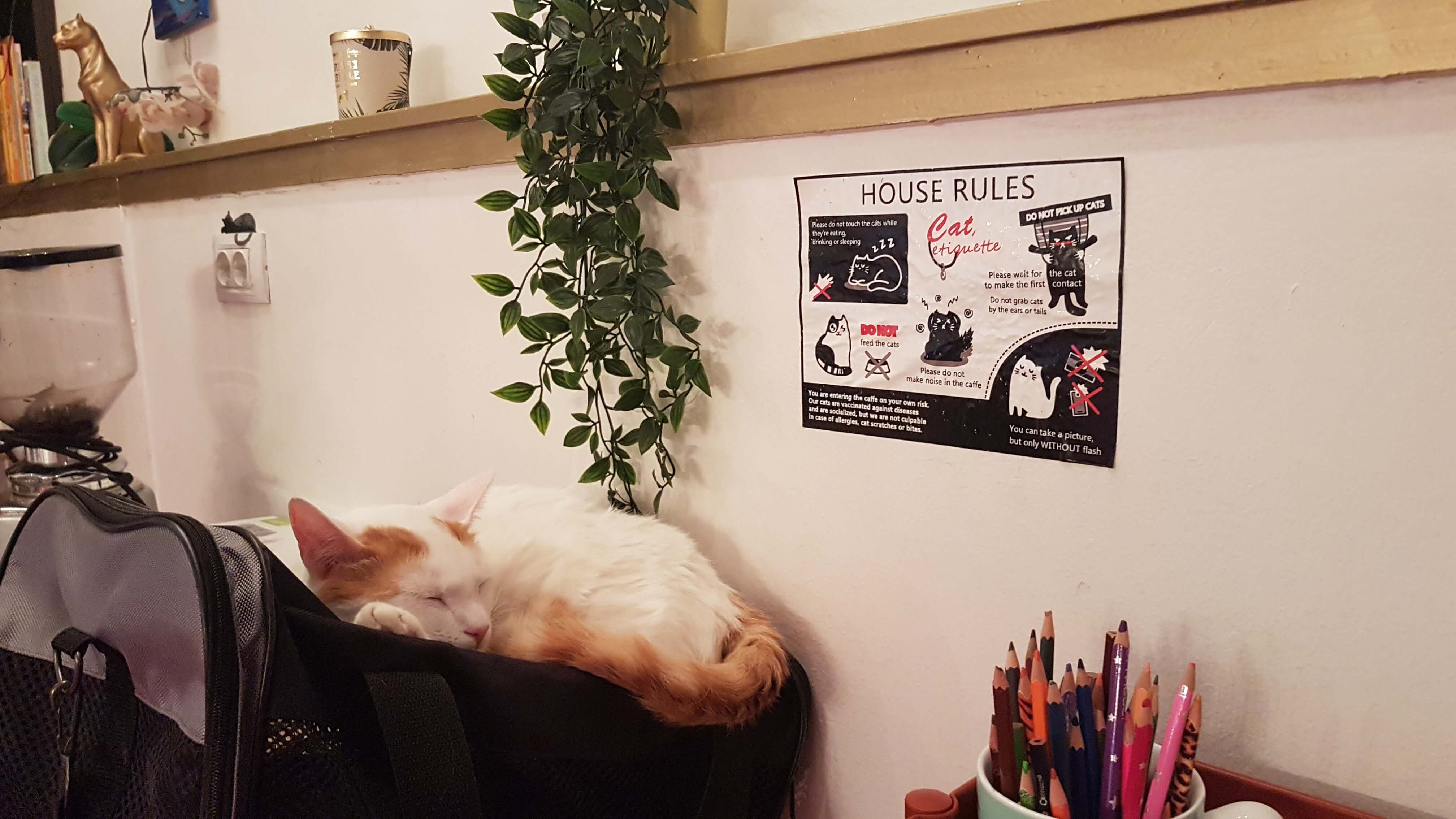
In Cat Caffe, everything revolves around putting cats' needs first. There are double doors at the entrance to prevent the cats from wandering off into the street and a safety net on the terrace. As soon as you enter, you'll be greeted with a list of rules to follow during your stay. It's forbbiden to touch the cats when they are eating and sleeping. It's also prohibited to pick the cats off the floor and other surfaces and take photos with your camera's flash on. The rule of thumb is to wait for cats to make the first move. If they are in the mood for a cuddle, they will make their wishes known. Otherwise, sit back and enjoy your drink - there is a variety of positively mouth-watering options with intriguing names and lots of sparkes and glitter.

Patrons are invited to stay as long as they like - there are even board games you can play during your stay and, most recently, cat-themed merchandise ready for purchasing.
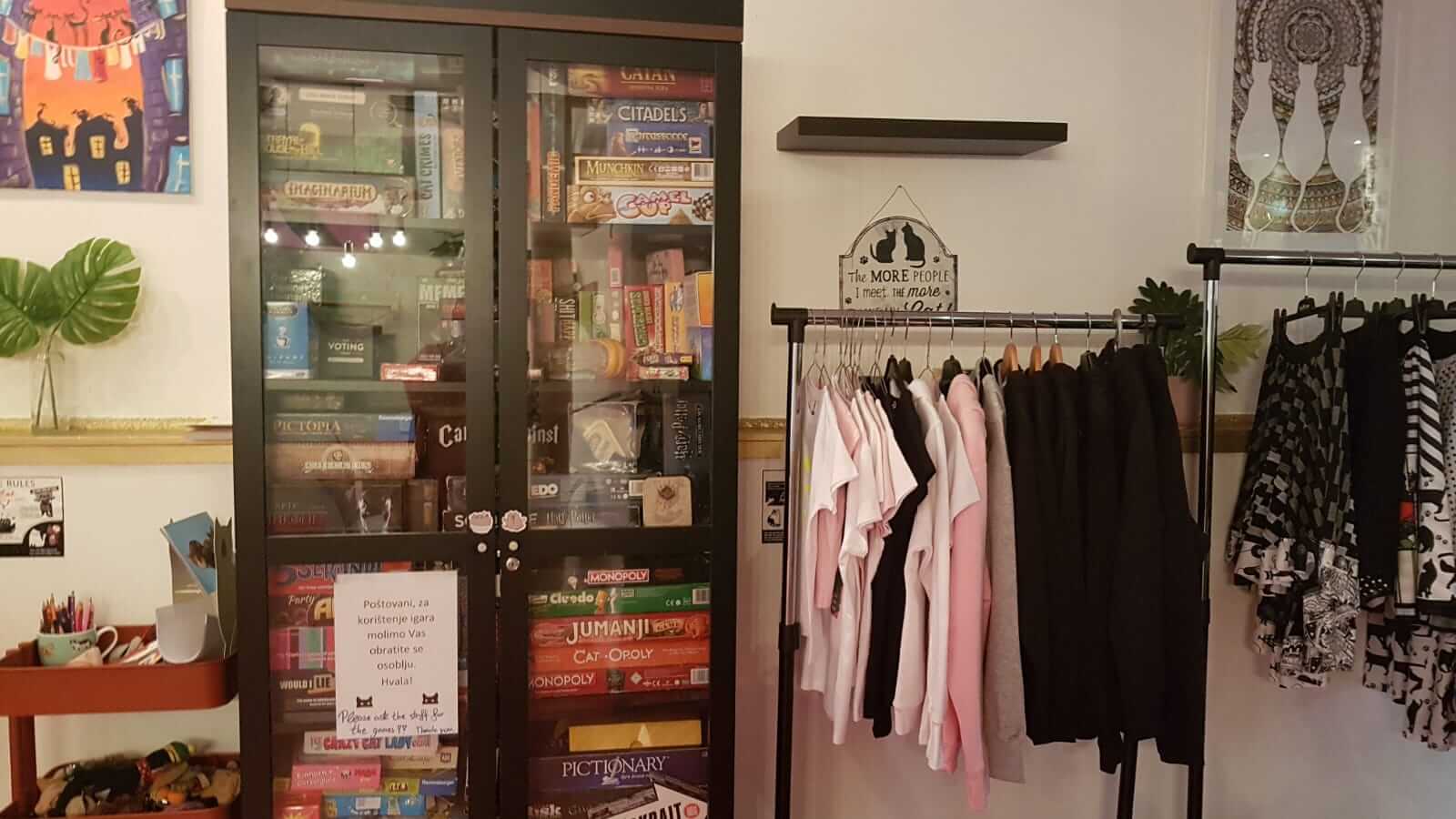
Cat Caffe is truly a shrine raised in the honour of cats - the walls are graced with cat illustrations and sayings and there is a special resting area where cats can relax after a busy day of observing the visitors.
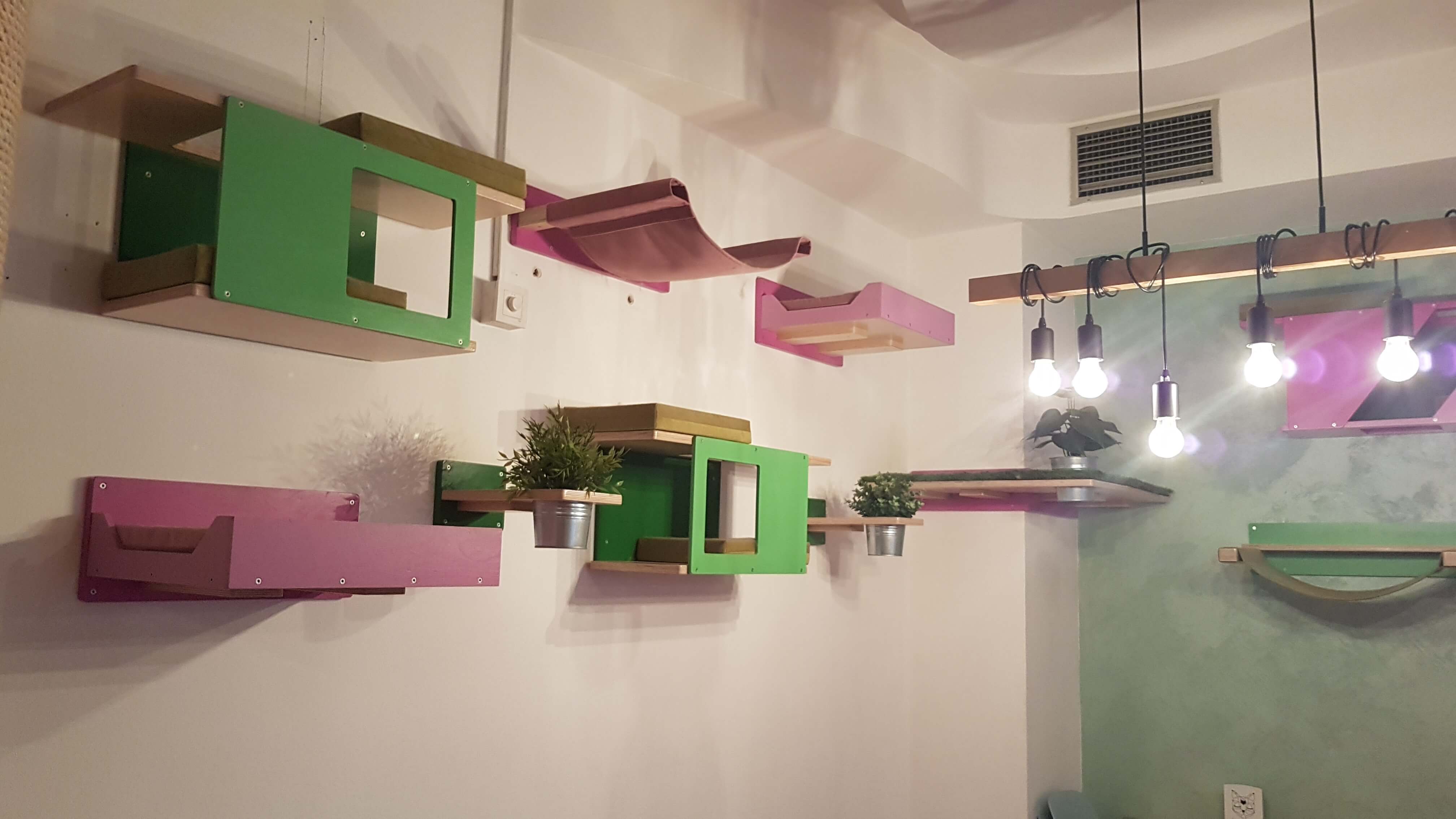
Care was taken with every detail - even cups and teaspoons bear the design developed together with a local artist. Unfortunately, some people like it so much that they decide to play dumb and take it home with them, something which has been happening a lot recently and has forced the owners to monitor security cameras even more closely. So, if you decide to go for a drink, look, but don't touch (or take with you) anything without permission. When in doubt, follow the cats' lead - don't do anything a self-respecting cat wouldn't do.
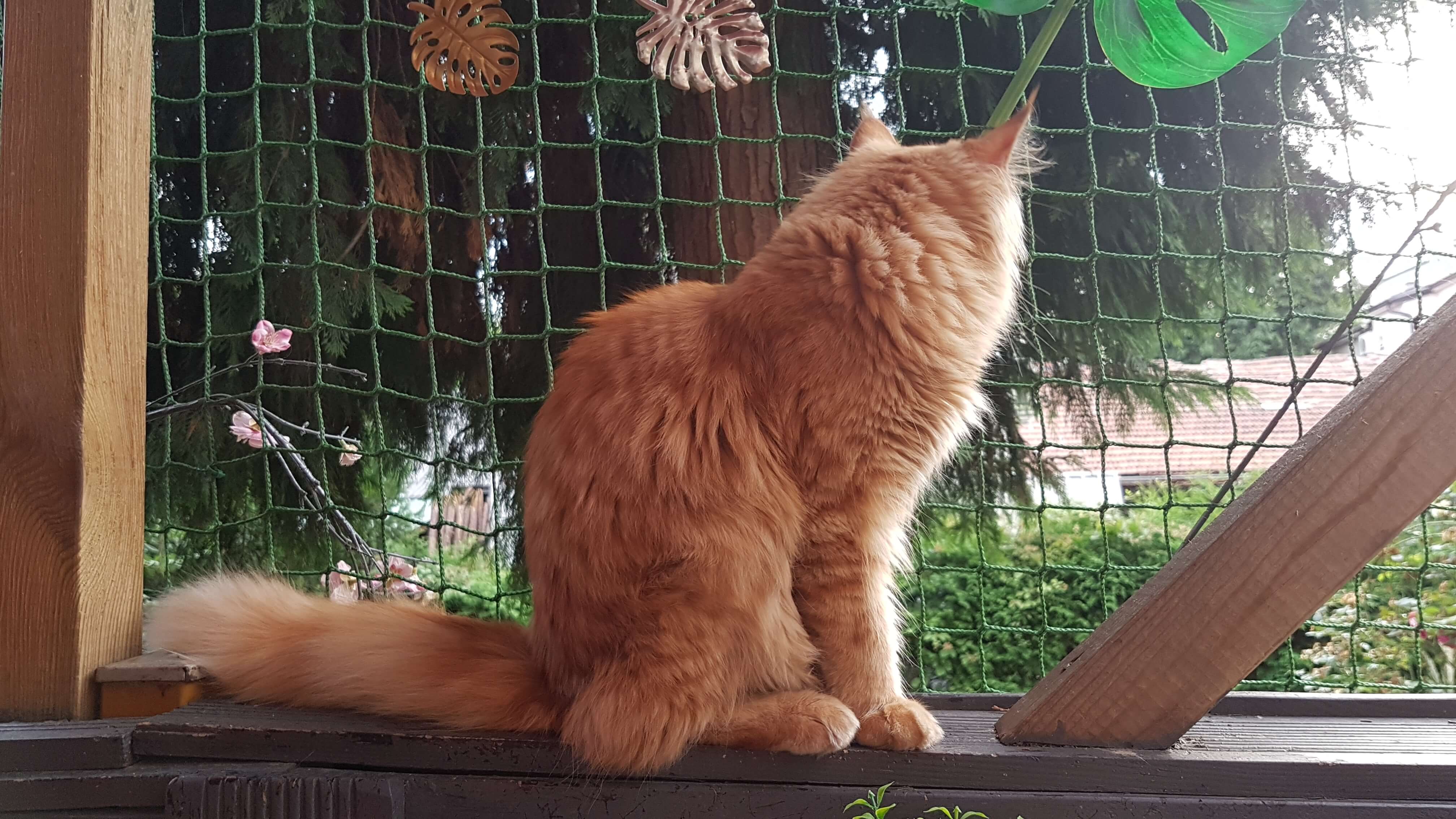
For more on lifestyle, CLICK HERE.
Serb National Council Unveils Memorial to Victims of Ustasha WWII Crime
ZAGREB, 3 July 2021 - The Serb National Council (SNV) unveiled in Donja Suvaja on Saturday a monument to the victims of a crime committed by the Ustasha on 1 July 1941, with SNV president Milorad Pupovac saying "the crime in Donja Suvaja, Osredci and Bubanj was one big evil."
"On 1 July 1941, the Ustasha, led by Maks Luburić, savagely tortured and killed women, children and older inhabitants in Donja Suvaja. We are erecting this monument on the 80th anniversary, in memory of their lives and horrific moment od death, but with faith in the idea of man's victory over hate," it says on the monument alongside the names of 290 victims.
According to an SNV statement, the crime in Donja Suvaja was one of the first mass crimes against women and children committed by the Ustasha, followed by a campaign of cleansing the Lika region, which resulted in an uprising of the people of Lika.
Pupovac said most of the 290 victims were women and children, while the rest were infirm and old. He said the crime took "only two hours" and that Luburić "decided to go a step further" by killing the victims "in the worst possible way, by slaughter and massacre."
"From 29 June 1941 until the beginning of July, all the worst methods were applied here, all the worst procedures seen in war, persecutions and forced resettlement," he added.
Pupovac said Lika also had been the site of the first Ustasha death camp, Jadovno, "which claimed dozens of thousands of lives in less than two months of operation."
"This was not a death factory as with some other peoples in World War II. Donja Suvaja was a horrible hate crime, a crime of extermination."
Pupovac reiterated that the Ustasha salute "For the homeland ready" was the "most shameful salute in Croatian history and the most shameful expression of the Croatian people's striving for its freedom," adding that it "was not, nor could in be, nor is anything else but a symbol of hate and crime."
He commended the state leadership's decision to "dedicate more attention to antifascism (this year), as never before, which we could see at Brezovica, where the first Partizan detachment came together."
"Everyone must realise that the blood and meat of that movement, said to have been the largest in Europe, was right here. The souls of these women, children and older people, and of those who since that moment never gave up, from 27 July, until the area of freedom had spread across the whole country at that time, including Croatia, are our anti-fascism," said Pupovac.
He called out "the high-ranking Croatian officials who, at recent commemorations, have been pardoning the crimes and criminals in this last war, just because they are our boys." He called on them not to downplay crimes because "that insults all of us who remember as citizens of this country."
The memorial in Donja Suvaja was erected as part of the SNV's culture of remembrance programme with funds from the government's office of human and national minority rights.
For more on politics in Croatia, follow TCN's dedicated politics page.
Mayor: Detained Zagreb Administration Employees Temporarily Sacked
ZAGREB, 3 July 2021 - Zagreb Mayor Tomislav Tomašević said on Saturday, after corruption-related arrests earlier this week, that the city administration employees placed in investigative detention would be temporarily terminated.
He told the press that he had warned about the way in which public spaces in Zagreb were leased back when he was a city councillor, announcing that the City Assembly would now change the necessary decisions and rules.
Tomašević said that one of the new city administration's moves had been to appoint an entirely new commission which decided on the lease of public spaces, adding that the old commission "was very problematic."
Asked if he thought there would be more arrests in the city administration, he said, "I think there will be and I think this is just the tip of the iceberg." He added that the trials should be as brief as possible to see if those arrested were guilty or not.
Zagreb is an open city
Tomašević was speaking to the press at the 20th Zagreb Pride Parade.
"We wish to say as the new administration that Zagreb is an open city celebrating all differences, and that no one can be discriminated against on any grounds, including sexual orientation."
He said this was the first time that a Zagreb mayor was attending Pride. "It took 20 years, too long if you ask me."
Tomašević recalled that he marched in the first Pride as a private citizen, later as a city councillor last year as an MP, and now as the mayor.
He labelled as dangerous some politicians' statements about the LGBT community this week, saying that scoring cheap political points on minorities in 21st century Croatia was pathetic.
For more on politics in Croatia, follow TCN's dedicated politics page.


